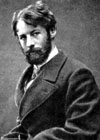 Baron Wilhelm von Gloeden was born in Mecklenburg (Northern Germany) in 1856. His father, who died at an early age, was a forestry official in the service of the Grand Duke of Mecklenburg-Schwerin. Gloeden's mother married again, a conservative politician and journalist named Wilhelm Joachim Baron von Hammerstein. After his schooldays Gloeden began to study art history at the University of Rostock, but soon left to study painting at the art college in Weimar.
Baron Wilhelm von Gloeden was born in Mecklenburg (Northern Germany) in 1856. His father, who died at an early age, was a forestry official in the service of the Grand Duke of Mecklenburg-Schwerin. Gloeden's mother married again, a conservative politician and journalist named Wilhelm Joachim Baron von Hammerstein. After his schooldays Gloeden began to study art history at the University of Rostock, but soon left to study painting at the art college in Weimar.
In 1878 he went to Italy, hoping to cure his lung problem. He settled in Taormina, a small seaside town in Sicily, which he was to call his 'heaven on earth'. There he regained his health, quite likely also as a result of the erotic fulfillment he found.
From the early 1880s on, he specialized in photographs of naked boys in bucolic settings, becoming a pioneer of open air photography. But it was not before 1895, when his stepfather lost his fortune and, consequently, Gloeden his allowance, that he turned professional. Before long he was selling his photographs on a large scale. He was helped in this venture by the timely gift of a large full-plate camera from Grand Duke Friedrich Franz III of Mecklenburg-Schwerin, whom he knew from childhood and who was a great admirer and collector of his work.
Curiously enough, his trade was not underground, as one might imagine, considering the prudish and notably homophobic atmosphere of the time. Many of the pictures were published in major photographic magazines and also shown at public exhibitions, where they were awarded prizes, even in England. It is true that Gloeden not only did nudes, but also portraits, landscapes, genre pictures and so on. Though he apparently never photographed anything openly sexual, the erotic implications of his nude pictures seem to be clear enough to make it downright astonishing that anybody could see in them nothing but 'ethnographic studies of young natives of the island of Sicily'.
Moreover, this admirer of the Greeks was genuine in his enthusiasm for the people of his adopted country--descendants of citizens of ancient Tauromenion, founded in 603 B.C. by Dionysos I, the Greek ruler of Syracuse. This origin often seemed to be confirmed by the perfect beauty of the male youth (though sometimes covered in rags). Drawing on the widely esteemed traditions of classical antiquity, Gloeden presented his pictures as 'illustrations of Homer and Theocritus', which was a useful subterfuge to justify his models' nudity and is also the reason for the camp style of some of his pictures. On the other hand, the very incongruity between an idealistic attempt to match the balanced repose of classical statues, and the natural bodily reality of these young peasants, fishermen and shepherds, can be especially charming. A few photographs by Gloeden even give the strange impression that they were indeed taken in the ancient world of the Greeks. There are also pictures that are not meant to express a specific idea, but show the dreamy state of vague expectation characteristic of adolescence, and these appear the most truthful and convincing.